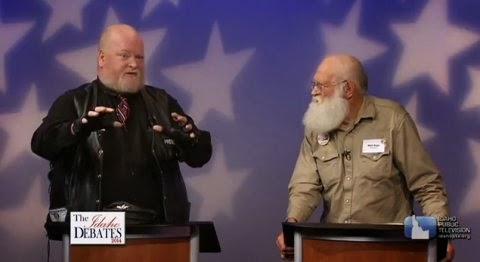Andy Borowitz probably has the best approach in dealing with Marco Rubio's pronouncement that human activity isn't affecting climate change, but then the Florida Senator and Presidential hopeful went one step further, calling Democrats hypocritical for questioning his view when they support abortion since "it's a proven fact life begins at conception."
Republicans still promote the same old issues, seemingly out of feigned ignorance, because it is hard to believe that university graduates could be so stupid. Yet, here was Florida State Representative Chuck Van Zant saying that "Common Core" promoted homosexuality, part of what appears to be an orchestrated campaign against the new curriculum that was endorsed by the National Governors Association, and is in effect in 44 states including Florida.
So why all these blatant displays of ignorance? Do Republican politicians actually believe their electorate is so stupid as to actually believe these statements. Seems like the answer is yes as populist legislators continually get re-elected like Louie Gohmert, who will pitch almost any screwball idea no matter how far out it is, like comparing LGBT activists to Nazis.
In fact, the Nazi comparison comes up quite often in GOP rhetorical flourishes. Tennessee State Senator Stacey Campfield had to walk back his crass comparison of new Obamacare enrollees to the prison camps in Nazi Germany, after the backlash he generated. But, this is nothing new. The GOP has long been pitching the notion that the Affordable Care Act would have "death panels" to determine who was worthy of health care after a certain age.
While the most overt accusations tend to be dismissed, even within the GOP, these broadsides continue to circulate in the conservative blogosphere, resurfacing at key moments. These talking points seem to be a way to divert attention away from pressing legislation like the immigration reform bill, which House Republicans can't quite bring themselves to vote on, largely out of fear of angering the base of their party, which has swung wildly to the right since 2010.
 |
| Harley and Walt telling it like it is |
You also have Ben Sasse, who won the GOP nomination for US Senator from Nebraska. He firmly believes that Biblical law trumps federal law, and has been very outspoken in this regard. You might think he was the graduate of some evangelical college, but Sasse is an Ivy Leaguer, just like Ted Cruz. In his 2004 Yale Ph.D dissertation, he wrote an exhaustive attack on the "Secular Left," principally in the form of Madalyn Murray O'Hair, an outspoken atheist from the 70s, who had long since fallen into obscurity thanks to the rise of Reagan's America.
Sasse appears to have been weaned on Jerry Falwell 1970s movement, "Moral Majority," which helped propel Ronald Reagan into the White House. The Southern preacher was inspired to politicize his beliefs after the fateful Roe v. Wade decision, which made abortion a political issue. He became one of Reagan's "spiritual advisers," and an outspoken religious conservative.
While the Tea Party doesn't seem to be fairing so well this election cycle, it has served its purpose in driving the GOP further to the right on virtually every issue, including those the GOP actively promoted before 2010, such as Common Core, which grew out of a "Standards and Accountability Movement" promoted by conservative governors in the 1990s. But, it seems that once it was adopted by the Obama administration it became "Obamacore" and subject to derision.
It would seem that at the root of all this real and feigned ignorance is the lack of any standard educational background. What we have are competing "visions," Biblical and secular, being played out on a national stage at a time when we desperately need to get beyond these archaic religious notions. The United States ranks near the bottom among OECD nations in education, which means that this ignorance will be perpetuated for years to come if we don't do anything about it.
But, it seems many on the Far Right consider Common Core just one more federal imposition. A guy like Walt Bayes just wants to home school his kids in the principles of the Bible, which is still being encouraged in many states with minimal standards to guide parents. While someone like Ken Ham would like his followers to believe that everything you need know is in the Bible, including the basis for scientific inquiry, which he so often likes to "challenge." This will not keep us abreast of OECD nations in education.
Maybe a reading of Maimonides' Guide to the Perplexed might help, as way back in the 12th century the Sephardic rabbi cautioned those from reading the Bible literally. Faith and reason can coexist. There is no reason to put them at odds to each other.

Comments
Post a Comment